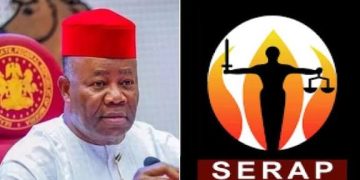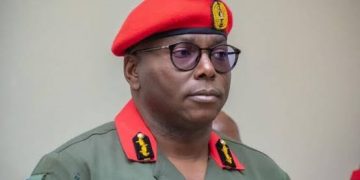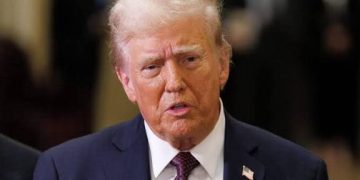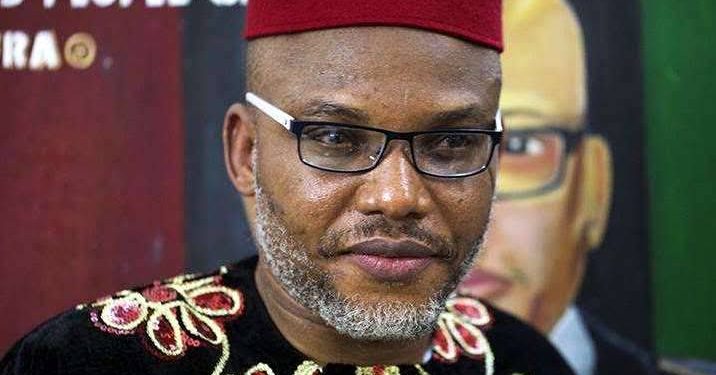On the 20th of this month, Abuja will be alive with revolutionary protests demanding the release of Mazi Nnamdi Kanu, the leader of the IPOB, from DSS detention. Mobilization for this significant protest has already begun. This event will not only highlight Nigeria’s abuse of fundamental rights but also test the government’s tolerance for dissent and peaceful assembly. The current administration appears intent on silencing laws and courts, prioritizing political expediency over due process, and suggesting that the law is irrelevant without state endorsement. The Principle of the Rule of Law, as articulated by A.V. Dicey, asserts the supremacy of our laws and courts, but not as far as they cooperate with the State and its repressive forces.
To provide some context, Mr. Kanu, who began as the Director of Radio Biafra, was first arrested in 2015 for his separatist agitations for an independent Republic of Biafra, which he claimed would encompass the Igbo-dominated states in the South-east and neighboring areas. Following their arrests, Mr. Kanu and his co-defendants faced charges of treasonable felony, unlawful possession of arms, and illegal importation of broadcast equipment in the Federal High Court in Abuja. They denied these charges but were denied bail until April 2017.
In September 2017, armed soldiers stormed Mr. Kanu’s home in Afara-Ukwu, near Umuahia, Abia State, leading him to flee the country. The Nigerian government subsequently obtained a court order designating IPOB as a terrorist group. After this military assault, Mr. Kanu was not seen publicly until months later when reports indicated he was in Israel.
At that time, it was reported that Kanu, a dual Nigerian and British citizen, was attempting to return to the United Kingdom. According to Premium Times, he eventually returned to the UK, where the government refused to label IPOB a terrorist organization. In the UK, he continued to issue incendiary statements against Nigeria, calling for attacks on state facilities and personnel in the South-east.
Kanu, a vocal critic of the Nigerian state and a proponent of the Biafran legacy, faced suspension from propagating what Professor Wole Soyinka termed his “hate rhetorics,” particularly from abroad. In an attempt to contain Kanu, the Buhari-led federal government ignited a legal controversy by allegedly mobilizing a group of felons to abduct him from Kenya, where he was arrested on June 27, 2021. This action, supposedly assisted by INTERPOL, was later denied by INTERPOL itself.
The Kenyan government distanced itself from the alleged arrest, with its High Commissioner to Nigeria stating that the accusations were “fictional” and “imaginary.” However, Nigeria’s then Attorney-General, Abubakar Malami SAN, claimed that Kanu’s capture was due to “international collaborative efforts,” raising serious questions about the legitimacy of this assertion.
Further complicating matters, Minister of Communications Lai Mohammed maintained that Kanu’s re-arrest was the result of diligent work by Nigerian security agencies in collaboration with other nations. Yet, the commitment to a fair trial for Kanu remains dubious, especially given his history of being denied due process.
Prominent figures like Professor Wole Soyinka condemned the illegal extradition, labeling it a “kidnap” that violates international law. He argued that Kanu’s alleged hate speech should be judged within the framework of the law, not through unlawful means.
In his words to BBC: “For me, was it right to have kidnapped [him]? You can say intercepted as much as you want but for me Kanu was kidnapped and that is wrong internationally and it is wrong morally,”
“It is not for me to tell the Nigerian government to prepare itself because there is going to be a huge squawk when the truth about how Kanu was arrested (becomes public),” he said.
He further stated: “We have to ask ourselves, what is the position politically, economically, mentally, spiritually? What is the collective state of mind of a vast section of this nation at the moment? And that state of mind is best described as distrust, total distrust.”
“This government has earned itself distrust – rightly or wrongly, that is for it to decide – anybody who is telling this government that the people of this nation still believes it and the government believes that, it is plunging this country further into the abyss.”
A High Court in Nairobi courageously condemned the state-sponsored abduction, declaring Kanu’s forced transfer to Nigeria unlawful and unconstitutional. Justice E.C. Mwita awarded him damages, affirming that Kanu was subjected to abduction, detention, and torture.
Various domestic courts in Nigeria have echoed this sentiment, consistently calling for Kanu’s release. Yet, the Nigerian State has ignored these rulings, showing a willingness to present him in court while refusing to release him.
A Federal High Court in Umuahia declared Kanu’s abduction unlawful, while a Court of Appeal ruling emphasized that his extraordinary rendition invalidated the ongoing trial. In 2022, the ECOWAS Court of Justice, the judicial arm of ECOWAS, chaired by President Bola Ahmed Tinubu, also condemned Kanu’s rendition and called for his release and compensation.
In a desperate attempt to justify Kanu’s detention, the Nigerian government has resorted to the outdated legal principle “male captus bene detentus,” which suggests that an illegally captured person can still be lawfully detained. This principle contradicts Nigeria’s constitutional provisions and international law, particularly sections 35, 36 and 46 of the 1999 Constitution (as amended) and Articles 6 and 7 of the African Charter on Human and Peoples’ Rights”. Nigeria’s Supreme Court’s case, Abacha v. Fawehinmi, affirms the bindingness of the African Charter.
Foreign legal authorities like United States v. Toscanino (1974) and R v. Horseferry Road Magistrates’ Court, ex parte Bennett (1994), have held that no trial could proceed where an accused person was brought before the court through “deliberate, brutal and illegal abduction”.
As far back as 1962, when Nigerian politician, Anthony Enahoro, was accused of plotting to overthrow the government. He fled through Ghana to the United Kingdom where he sought asylum. Nigeria did not swoop on him in blatant contravention of known laws and sovereignty, she attempted to extradite him under the Fugitive Offenders Act of 1881. This translated to a legal battle that lasted for six months in Britain before Prime Minister Harold Macmillan eventually granted his extradition in May 1963. He was flown back to Lagos. One has reasons to worry, seeing this happening in the 21st Century.
I challenge President Tinubu to heed the voices of revolutionary activists like Omoyele Sowore and other concerned Nigerians by releasing Nnamdi Kanu. The Judiciary must also assert its authority by leveraging the people’s power set to mobilize on October 20, 2025, to pressure the executive to enforce its rulings. Kanu’s release would reaffirm the Judiciary’s role as the last hope for the common man.
Tunde Akingbondere, an author and a graduate of law writes from Ondo State






































